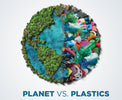
This Earth Day: Planet vs Plastics
, by Planet Green, 3 min reading time

, by Planet Green, 3 min reading time
The Earth stands as a magnificent cradle of life; a testament to the wonders of our universe. Hosting billions of humans alongside trillions of other organisms, our planet generously provides not just our wants but also our essential needs. From the sustenance of food to the purity of water, from the crispness of the air we breathe to it’s life-giving oxygen, every vital element originates from our Earth’s environment. Our reliance on what the environment provides emphasizes the imperative of proper conservation and sustainable development. Each component of this intricate planet plays a crucial role, and any disruption resonates profoundly, affecting the delicate balance that sustains life as we know it. As we celebrate Earth Day, we honor this extraordinary planet and recognize the urgent need to safeguard its precious resources.
On Earth Day, we reflect not only on the beauty of our planet but also on the pressing environmental challenges we face. While the Earth sustains us in countless ways, our actions have taken a heavy toll on its delicate balance. Among the myriad issues threatening our planet, plastic overuse stands out as an urgent concern.
Plastics have become omnipresent, with a staggering 90.5% of the 8 billion tons produced since the 1950s not being recycled (Science Advances, 2023). This overproduction has led to a crisis of plastic pollution, infiltrating every aspect of our lives and environment. The theme of this year's Earth Day, "Planet vs Plastics," has organizers calling for a 60% reduction in plastic production by 2040 to mitigate this crisis and the goal of a “plastic-free” future.
Single-use plastics (SUPs) are particularly problematic, constituting a significant portion of plastic waste. Items like grocery bags, food packaging, bottles, and cutlery contribute to the 66% of plastic waste generated from households. The impact is global, with Asia alone accounting for nearly half of the plastic waste generated worldwide.
Recognizing these challenges, initiatives like Planet Green Recycle have emerged as champions of sustainability. By diverting millions of printer cartridges away from landfills and remanufacturing used OEM ink cartridges into new products, they offer a sustainable alternative at a lower cost to both consumers and the environment. This approach aligns with global efforts to reduce plastic waste and promote circular economies.
![]()
Governments and businesses worldwide are stepping up their efforts to address the pressing issue of plastic pollution. Across the globe, there is a growing recognition of the need for decisive action. This has led to the implementation of bans on plastic products and the introduction of policies promoting recyclable packaging, marking significant progress in the fight against plastic waste.
In 2002, Bangladesh became one of the first countries to put a ban on plastic bags with others following suit. Rwanda, Kenya, India, Canada and the European have enacted laws against single-use plastic such as straws and cutlery, plates and cotton buds and Australia has been discussing broader restrictions to combat the issues. In the US, certain states have enacted bans and restrictions on plastic bags and single-use plastics, but more needs to be done.
Notably, major corporations such as Coca-Cola, Unilever, Wal-Mart, and L'Oréal are setting ambitious goals to reduce their plastic footprint and actively promote recycling initiatives. These companies are showing an effort to embrace sustainability as a core value while demonstrating the potential of leadership in driving positive change for our planet and the environment.
As we commemorate Earth Day, let's remember that our planet's health is intertwined with our own actions. By addressing plastic overuse, supporting initiatives like Planet Green Recycle, and advocating for sustainable practices, we can protect Earth for future generations. This Earth Day, let's renew our commitment to preserving our planet's beauty and diversity.

Every year, millions of used products, from ink cartridges to electronics, are discarded and sent to landfills. While many view these items as trash, remanufacturing...

You know the feeling - your printer’s low ink warning pops up right when you need to print something important. You hop online, search for...

In today’s fast-paced world, convenience often takes priority over sustainability. Single-use products, from plastic straws to disposable ink cartridges, offer quick solutions at the expense...

The allure of cheap products is hard to resist. Low-cost imports from countries like China flood the market, offering convenience and affordability. However, these seemingly...
Toll-free: (800) 377-1093 Local: (818) 725-2596
info@planetgreenrecycle.com
Toll-free: (800) 377-1093 Local: (818) 725-2596
info@planetgreenrecycle.com